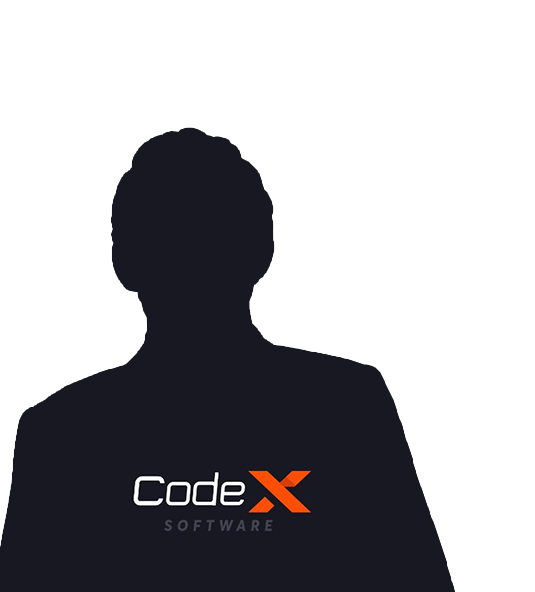Get Free Trial Week Developer Access, Try Before You Hire. Click Here to Claim Now
Introduction:
Today, the majority of business leaders are having a tough time deciding whether they should buy or build software. The technologies like AI, automation, cloud computing, and other things have changed the way of doing business. According to research, 78% of companies globally are using AI to enhance their business operations. Digital transformation has become the top priority for businesses today in order to keep up with the evolving technologies and fulfill changing user needs.
If you are the business owner trying to decide whether to build custom software or buy an off-the-shelf solution, you have searched the right article. This article will guide you through the build vs. buy software decision, understand important factors, pros and cons of both buy and build software, to make a confident choice and invest smartly for the business.
What is Build vs Buy Software?
Before deciding on Build vs Buy Software, let's understand the basics of both. Build means you create the whole software from scratch with custom features and functionalities required for your business. It involves identifying the business as well as user problems, choosing the appropriate tech stack of software, and other things that benefit the business in every way.
In short, you can say build as a custom development where the developers build the software as per your custom needs and unique USPs.
On the other side, buy refers to purchasing a ready-made software solution that already exists in the market. It has limited options, and you are bound to the vendor for various functionalities. Plus, it can't be customized.
8 Key Factors to Consider Before Deciding Whether to Build or Buy Software
Buying and building software are both important financial decisions and impact the overall performance of the business. Hence, before deciding, you must do a build vs buy software analysis. Here are the 8 important factors you should consider for build vs buy software analysis to make the wise choice.
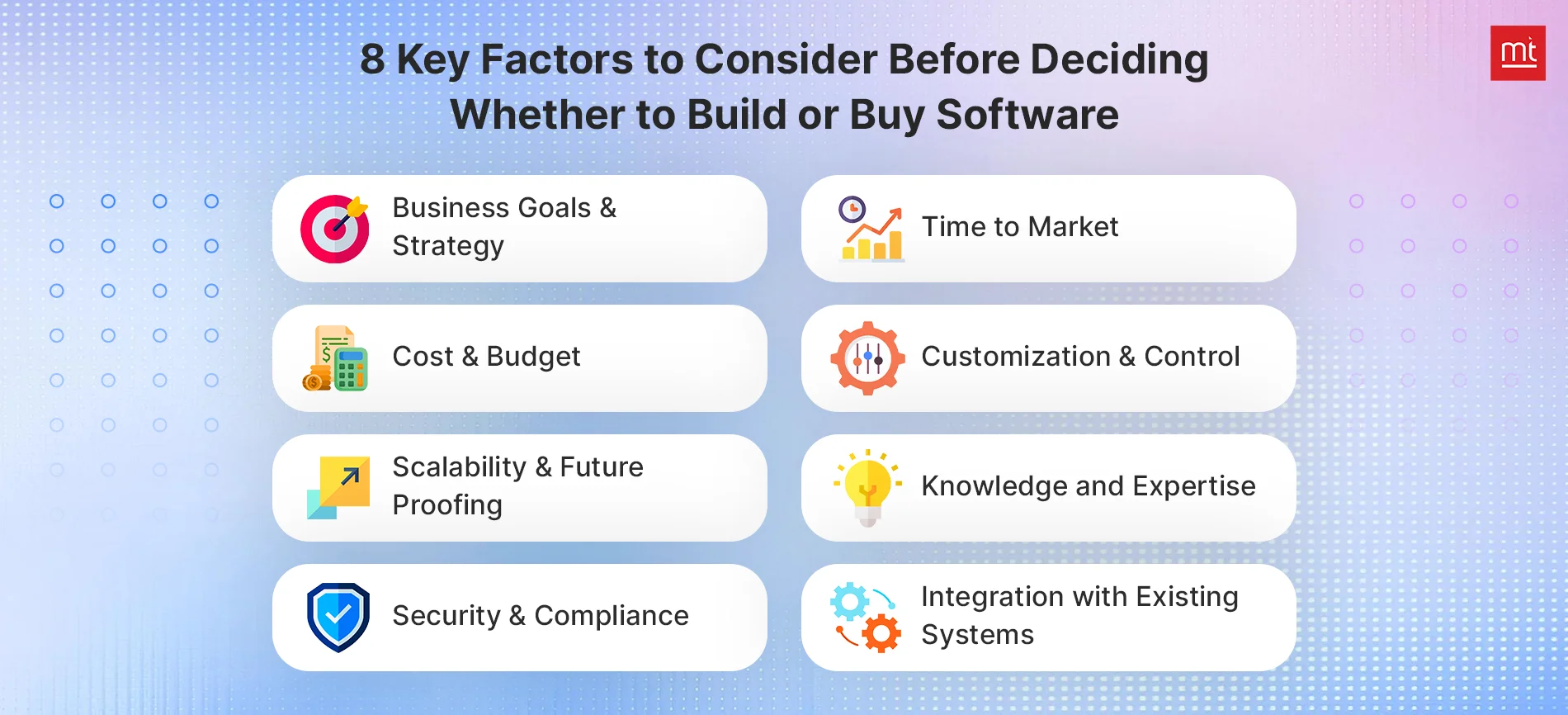
#1. Business Goals & Strategy
Software you buy or develop will be used by the entire team, hence it must align with your goals and strategy. The good idea is to prepare a document of required features, functionalities, strategies, technology stack, and necessary things, and then compare which one suits you more perfectly.
Pro tip: Custom software development is a better choice, as your competitors can also buy readymade software and use it. So, in order to be unique and follow different strategies, building a custom solution is best.
#2. Time to Market
Consider time, how quickly you want to enter into market. If time is the important constraint, buying off-the-shelf software can help to launch solutions quickly in the market because building custom ones can take time.
#3. Cost & Budget
Building and buying software both need money. You must weigh down the price of building and buying readymade. If you are short on budget and getting your desired features and functionality in readymade software at a reliable rate, go for that.
Developing a custom solution may look expensive at initial stages, but it is useful to scale and customize the business requirements as well as user needs in the long run.
Well, today there are also options to customize the ready-made solutions, compare both, and choose what suits your current needs.
#4. Customization & Control
Building a custom solution offers you full control and flexibility. If your business requires a specific workflow and has unique needs, then building software is a great option. Analyze your business workflows, operations, target audience, features, and other needs to get an idea of what level of customization and control you need.
Also, consider future requirements, if there are any chances of customization in the future.
#5. Scalability & Future Proofing
The business world is constantly changing with new or other innovations, you must make a choice that future-proofs your business. If your business has everything stable, like features, operations, and doesn't scale much, you might find the read-made solutions with specific features. Plus, you can also renew the subscription as needed.
After all, the choice should be made considering business growth. It needs careful planning. If your business is volatile expanding and needs to adapt with regular updates and technologies, go for custom solutions.
#6. Knowledge and Expertise
Consider your team’s expertise and knowledge, and whether they are capable of using suitable software. Custom software needs to be maintained and updated. While readymade solutions are maintained by the vendor itself.
#7. Security & Compliance
Off-the-shelf software follows security measures and compliance, but you need to check whether it meets your legal security needs. You need to share some of your necessary business data with paid software to either automate or ease the business operations.
Also, in case of custom software, you get the freedom to customize it, but you need to hire a highly experienced developer whom you can rely on for security.
#8. Integration with Existing Systems
Custom software can be customized and adjusted to integrate with your current workflows and systems, but ready-made tools are designed for a specific device and compatibility needs. Check all your business options and necessary compatibility conditions before choosing from buy and build software.
Pros and Cons of Building Software
Building software has its own pros and cons. You just need to weigh down the pros and cons and choose what works best for the business.
Pros of Building Software:
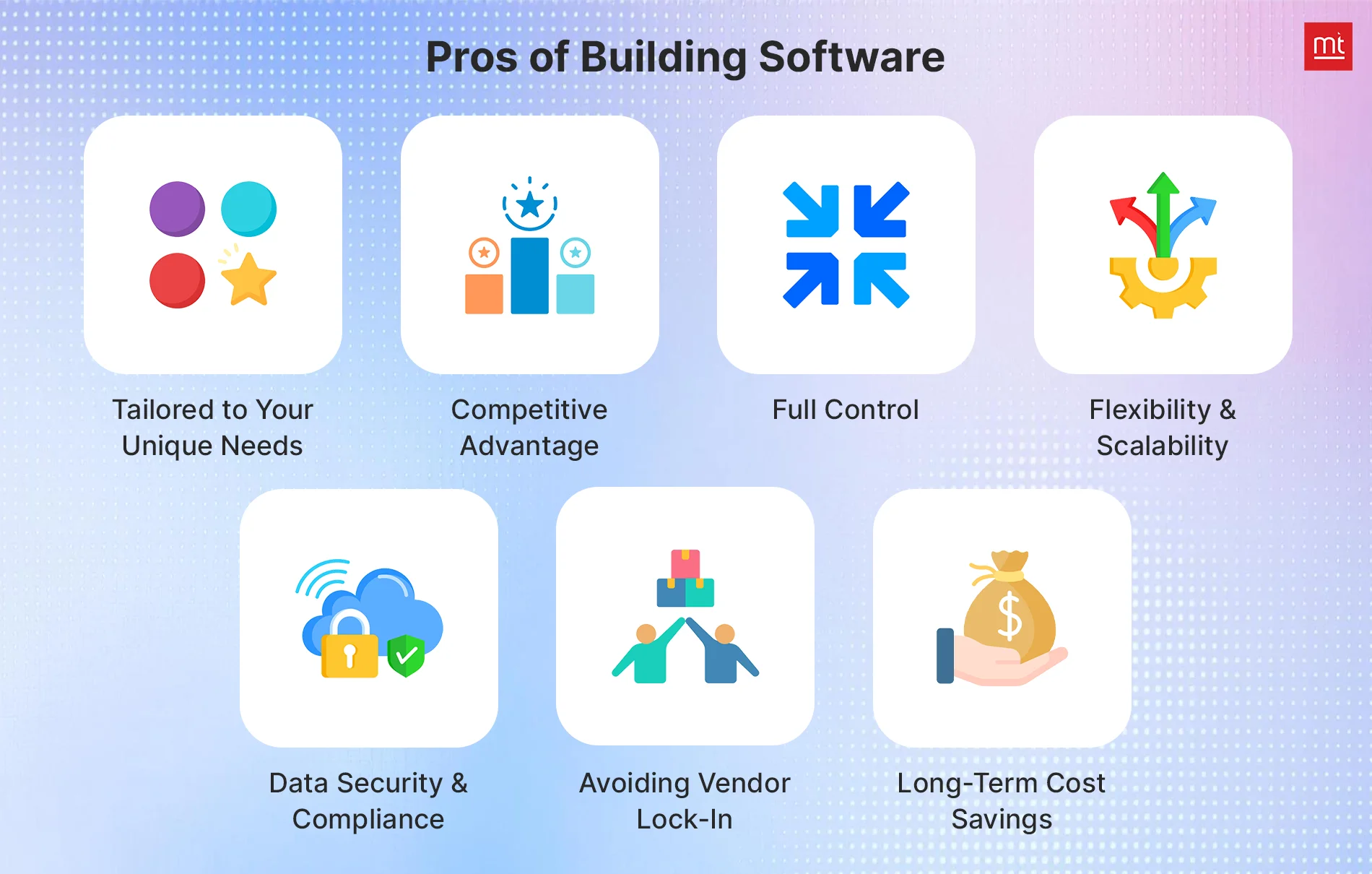
1. Tailored to Your Unique Needs
They are custom-made softwares that can mould themselves according to your custom workflows, processes, and business needs.
2. Competitive Advantage
You develop custom software based on business specifics ,including the pain points, that is why it delivers something that really works and can be adopted as a strategic advantage.
3. Full Control
You don't need to rely on third-party vendors to update the technology, either; You choose which capabilities to add or remove and when, and how to keep the software up-to-date.
4. Flexibility & Scalability
It is possible to customize such software to keep pace with evolving business requirements. You can have any number of features.
5. Data Security & Compliance
You can apply robust security with custom functions and satisfy your legal and compliance requirements.
6. Avoid Vendor Lock-In
You are not tied to vendors, hence you only spend once at the initial stage, plus you can modify it if future changes are required.
7. Long-Term Cost Savings
You can save costs on long-term software as it does not have any subscription fees, hidden costs, or license renewals.
Cons of Building Software:

1. Longer Development Time
It can take time to develop, depending on complexity and iterations. If you need something fast, this is a minus point.
2. Requires Technical Expertise
You require an experienced in-house team or a trusted development partner to design, build, and maintain the software.
3. Maintenance & Updates
When it’s built, fixing bugs and rolling out improvements is up to you, which is ongoing work and a cost too.
4. Harder to Predict Costs
It does not have a fixed cost like readymade softwares; if the market changes or user needs change, it can add unexpected changes.
Pros and Cons of Buying Off-the-shelf Software
Pros of Buying Software:

1. Lower Initial Costs
Buying software is affordable because you only pay a fixed cost for a month or annually, based on your needs.
2. Ease of Use
They are user-friendly as they are developed for both technical and non-technical users. It has guiding tutorials and drag-and-drop functionality.
3. Quick Deployment
It helps to complete the project quickly, as they are ready to use, and they can be easily connected with existing systems.
4. Proven Solutions
You can trust readymade software because they are already used by many businesses.
5. Updates and Support
Vendors offer updates, security patches, and maintenance of software, you don't need to worry about managing it.
Cons of Buying Software:
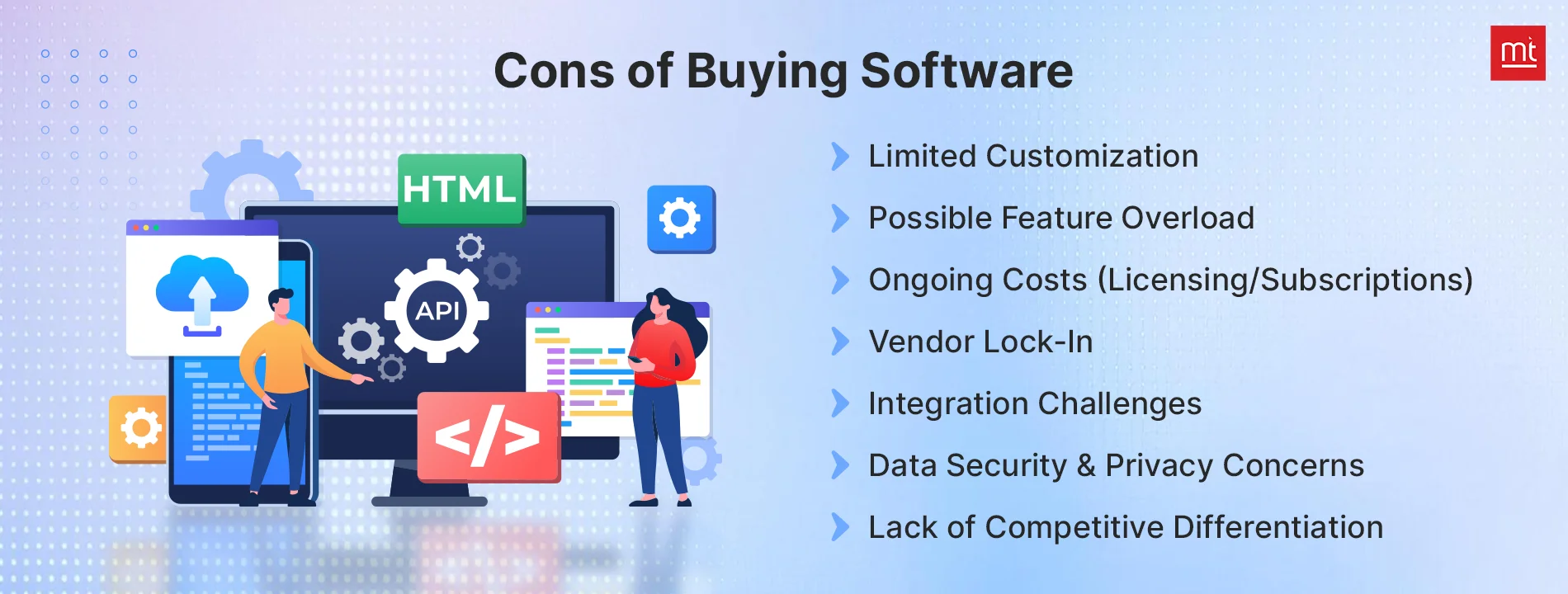
1. Limited Customization
Features are fixed by vendors, hence it does not allow customization of the features here if your business has unique needs.
2. Possible Feature Overload
You might need to pay for features you don’t use, because readymade software has a fixed cost model(monthly/ annually).
3. Ongoing Costs (Licensing/Subscriptions)
If you add monthly costs on a continuous basis, it can be expensive than custom development over time.
4. Vendor Lock-In
Your business may become dependent on a specific vendor, and switching later could be costly or complicated if your data and processes are dependent on that software.
5. Integration Challenges
It might not support or work properly with your existing tools or systems. You might need extra setup and plugins.
6. Data Security & Privacy Concerns
Since your data is stored and managed by a third party, you need to trust that the vendor follows strict security and privacy standards.
7. Lack of Competitive Differentiation
Because anyone can buy the same tool, it doesn't give you a unique edge or advantage in the market like a custom-built solution might.
Use Cases – When to Build vs When to Buy
To make sure you invest your hard-earned money right, its important to know first when to build and when to buy software. This can vary from business to business, and many factors contribute to it.
When to Build Custom Software?
You prioritize data security and want full code ownership.
Your Business Model is Unique and needs customization.
You Want a Competitive Edge.
Your business is highly scalable.
When to Buy Software?
You have budget constraints.
You want quick deployment.
If pre-built solutions are already available.
Hybrid Approaches – Best of Both Worlds
A hybrid approach can be beneficial when your business needs speed as well as customization. This approach is also best to control costs as well as implement customization smartly in the software. Here is how you can implement the hybrid technique:
- You can use platforms like Salesforce and add custom modules for unique workflows.
- Use open-source tools or a no-code, low-code platform and build only the necessary features afterwards.
- Many companies build core systems, like customer databases, and buy add-ons like analytics or chat tools. This way, you stay efficient without giving up control.
- This way, you can implement a hybrid approach by assessing which features need custom solutions and which can be handled by trusted, off-the-shelf tools.
How to Make a Build vs Buy Decision: Step by Step
1. Know your requirements – Identify the gaps
To start with, work out your specific business requirements. What are you addressing? Divide your workflows to identify points of pain and inefficiency. When you know exactly what you need, it becomes easy to compare custom vs. off-the-shelf options. Be specific — this isn’t about features you think you might need, but features that will address actual pain points in your process.
2. Does your timeline allow for custom development?
It takes time to build software – weeks, months, years. If your goal is urgent or tied to a quick launch, don’t choose custom development. But if your timeline is flexible and you want long-term value, building software can be worth the wait. Weigh your time-to-market urgency against the value of something built just for you.
3. Research the market
Do some research and see what software solutions are already out there. Analyze how you can create unique and useful solutions from other competitors. If there are software options that meet your requirements and align with your goals, you can go for off-the-shelf solutions.
4. Costs and risks
Analyze the costs and risks of both approaches. Focus on long-term costs like maintenance, updates, support, or license renewals. Consider risk factors like delays, hidden integration costs, or vendor lock-in, this can be a real nightmare. If you want to build software, consider development time, tech team costs, and ongoing maintenance. This cost-benefit and risk analysis will give you clarity.
5. Choose the right software development company
If you have decided to build software, then you must hire an experienced custom software development company. Look for companies with experience in your industry and transparent workflows. Ask for case studies, references, and clarity on timelines and budgets. A good development partner won’t just write code—they’ll help you shape a long-term product strategy.
Final Thoughts
So, by reading the blog, you might have got an idea about the build vs. buy software decision. Custom-Built and Off-the-Shelf Software both are good choice, but you must make a decision by analyzing your business, how unique and complex your requirements are, the timeline of the project, and the budget. Compare build vs buy software pros and cons, along with the software development trends, to choose the right option.
Ultimately, it should meet your business and strategic goals. If you are still stuck between the build vs. buy software decision, reach out to Manektech by booking a free consultation. We are a leading custom software development company, with a fine grip on providing software development services tailored to businesses.
Subscribe to Our Newsletter!
Join us to stay updated with our latest blog updates, marketing tips, service tips, trends, news and announcements!



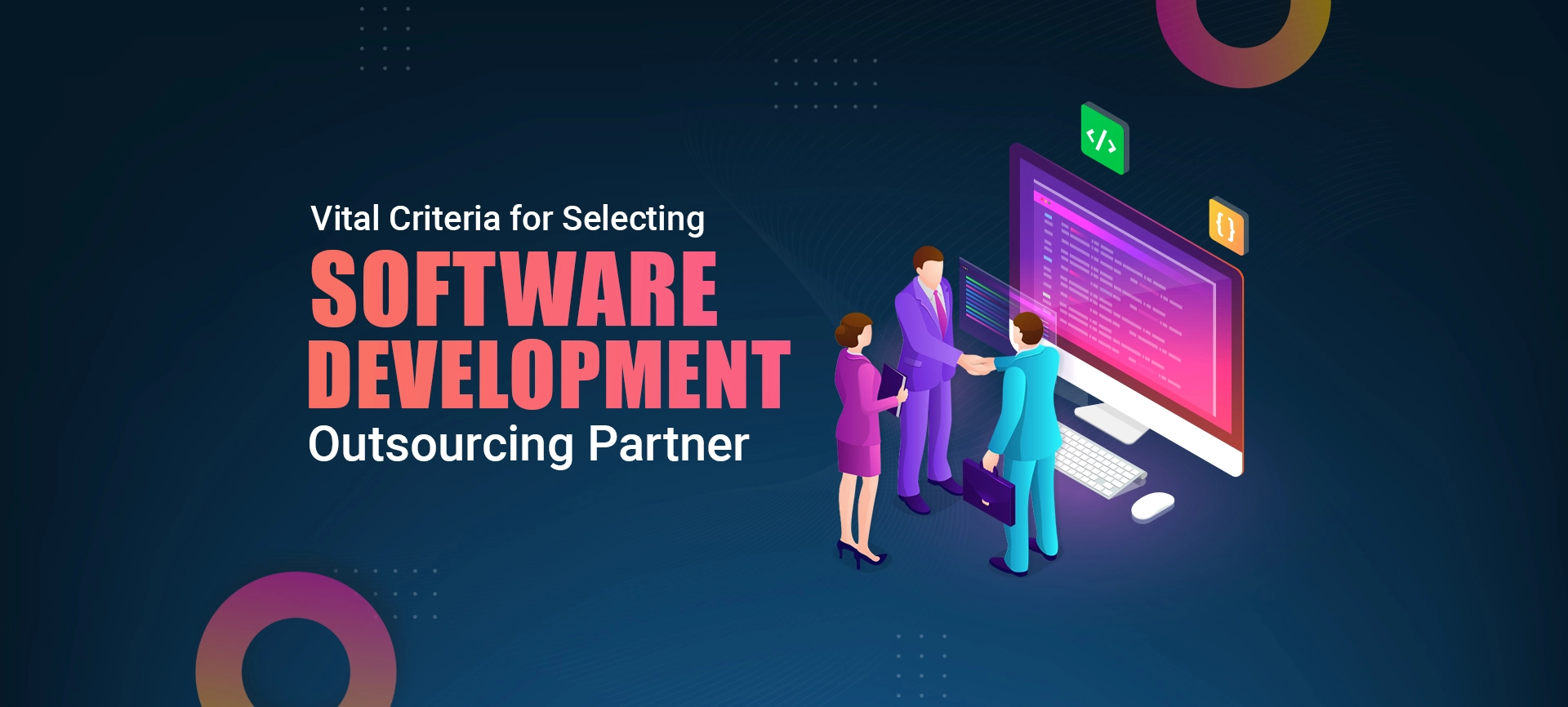
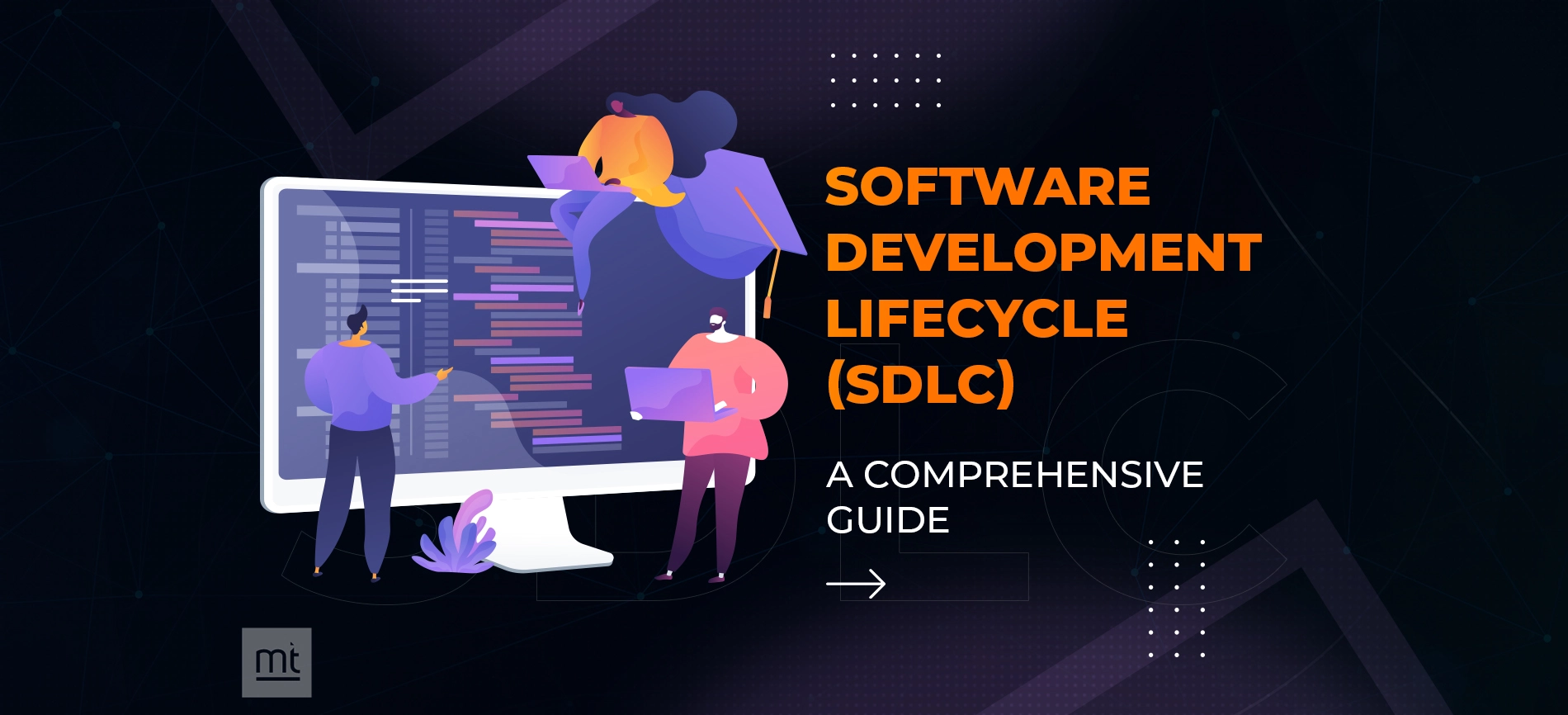
![Top 10 Software Development Companies in USA [Updated 2025]](https://www.manektech.com/storage/blog/image/1746450897.webp)



